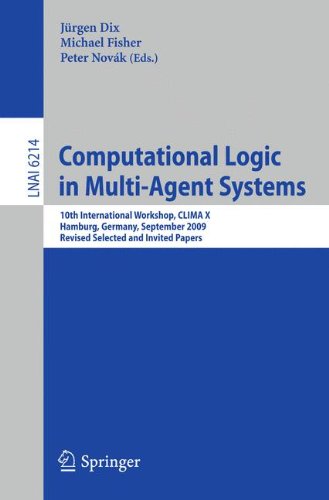

Most ebook files are in PDF format, so you can easily read them using various software such as Foxit Reader or directly on the Google Chrome browser.
Some ebook files are released by publishers in other formats such as .awz, .mobi, .epub, .fb2, etc. You may need to install specific software to read these formats on mobile/PC, such as Calibre.
Please read the tutorial at this link: https://ebookbell.com/faq
We offer FREE conversion to the popular formats you request; however, this may take some time. Therefore, right after payment, please email us, and we will try to provide the service as quickly as possible.
For some exceptional file formats or broken links (if any), please refrain from opening any disputes. Instead, email us first, and we will try to assist within a maximum of 6 hours.
EbookBell Team

4.7
26 reviewsThese are the proceedings of the 11th International Workshop on Compu- tional Logicin Multi-Agent Systems (CLIMA-XI), held during August 16–17,in Lisbon, collocated with the 19th European Conference on Arti?cial Intelligence (ECAI-2010). Multi-agentsystemsarecommunitiesofproblem-solvingentitiesthatcanp- ceive and act upon their environment in order to achieve both their individual goals and their joint goals. The work on such systems integrates many techno- giesandconceptsfromarti?cialintelligenceandotherareasofcomputingaswell as other disciplines. Over recent years, the agent paradigm gained popularity, due to its applicability to a full spectrum of domains, such as search engines, recommendation systems, educational support, e-procurement, simulation and routing,electroniccommerceandtrade,etc.Computationallogicprovidesawe- de?ned, general, and rigorousframeworkfor studying the syntax, semantics and procedures for the various tasks in individual agents, as well as the interaction between, and integration among, agents in multi-agent systems. It also provides tools, techniques and standards for implementations and environments, for li- ing speci?cations to implementations, and for the veri?cation of properties of individual agents, multi-agent systems and their implementations. The purpose of the CLIMA workshops is to provide a forum for discussing techniques, based on computational logic, for representing, programming and reasoning about agents and multi-agent systems in a formal way. Former CLIMA editions have been conducted in conjunction with other - jor Computational Logic and AI events such as CL in 2000, ICLP in 2001 and 2007, FLoC in 2002, LPNMR and AI-Math in 2004, JELIA in 2004 and 2008 and MATES in 2009. In 2005 CLIMA was not associated with any major event.